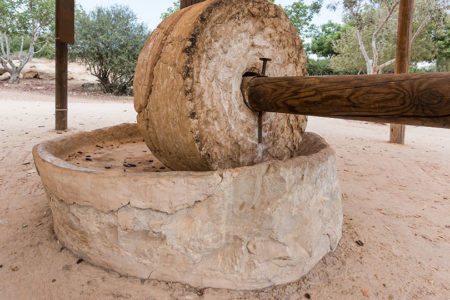Vision of God’s Coming Wrath Revelation 15:1–8
Revelation 15, although short in length, is not short in significance or importance. It provides a needed introduction to the final phase of God’s wrath. In this chapter John was given two glorious visions from heaven in preparation for the coming bowl judgments. First he saw martyred saints, who were victorious over the Antichrist, singing the song of Moses and the song of Christ the Lamb. Then he saw seven angels proceeding from God’s Temple in heaven with bowl judgments in hand, ready to pour out God’s wrath.
The events of God’s wrath are centered on the seven seals opened by the Lamb of God (6:1–17; 8:1). With the opening of the seventh seal, seven trumpet judgments were unleashed on the earth (8:1–9:9, 21; 11:15). With the blowing of the seventh trumpet, and after a lengthy interlude including chapters 10 to 14, the seven bowl judgments are poured out just prior to Christ’s Second Coming.
As predicted by Christ, the seal, trumpet, and bowl judgments grow in intensity: “For then shall be great tribulation, such as was not since the beginning of the world to this time, no, nor ever shall be. And except those days should be shortened, there should no flesh be saved; but for the elect’s sake those days shall be shortened” (Mt. 24:21–22). If the Tribulation judgments were not cut off by the return of Christ, no life would survive on the earth—an awesome fact!
Scene in Heaven
John recorded seeing “another sign in heaven, great and marvelous” (v. 1). The word “another” indicates that other signs preceded this one, two of which are mentioned in Revelation 12. The first sign refers to Israel, described as “a great wonder in heaven—a woman clothed with the sun, and the moon under her feet, and upon her head a crown of twelve stars” (12:1). The second sign was a “wonder in heaven…a great red dragon” (12:3), representing Satan. The third sign is a group of “seven angels having the seven last plagues” (15:1) of God’s wrath. These three signs are “Great and marvelous” because they speak of the works of the “Lord God Almighty” (v. 3). This is the final expression of God’s terrible wrath or anger on the beast’s satanic system (13:8). These judgments are labeled “last” because they “filled up [completed] the wrath of God” (v. 1). This indicates that the preceding seals and trumpets are also to be seen as judgments. However, the “seven angels” (v. 1) who implement these judgments are a different group from those previously mentioned.
In the heavenly vision John saw, “as it were, a sea of glass mingled with fire” (v. 2). The “sea of glass” was first revealed in 4:6 and functioned as a mirror, reflecting God’s glory and majesty. This is symbolic of God’s purity, holiness, and separation from creation. Here it is “mingled with fire,” symbolizing the divine judgment that is about to be manifested from a holy God.
Next John saw Tribulation saints “that had gotten the victory over the beast, and over his image, and over his mark, and over the number of his name, standing on the sea of glass, having the harps of God” (v. 2). These victorious believers did not take the mark of the beast or worship his image. Rather, they suffered martyrdom for their faith (13:7–18). This group of faithful believers will receive their resurrected bodies and rewards just prior to the Second Coming of Christ and will come back to rule with Him during the Millennial Kingdom (20:4, 6). In the interim, John saw them “standing on the sea of glass, having the harps of God” (v. 2).
Four groups are mentioned as having harps in heaven: living creatures and elders (5:8); heavenly singers (14:2); and the martyred Tribulation saints (15:2). Harps were not given to all the martyred dead (cp. 7:9–17). The harpers have a privileged position before God’s throne. They contribute greatly to the heavenly harmony of the chorus that the redeemed offer to God.*
Songs in Heaven
The martyred saints sang two songs. The first was “the song of Moses” (v. 3). There are two songs composed by Moses. The first is recorded in Exodus 15 and celebrates Israel’s victorious deliverance and triumph over Pharaoh’s army, all of whom drowned in the Red Sea. The second, recorded in Deuteronomy 32, sets forth God’s greatness, historical faithfulness to Israel, and ultimate victory over their enemies. Commentators are divided on whether one, both, or a combination of both Mosaic songs is referred to in chapter 15. We cannot be dogmatic, but evidence suggests that this passage refers to the song in Exodus 15.
Some commentators try to link the “song of Moses” with the “song of the Lamb” (v. 3). In so doing, there seems to be an effort to link Israel with the church. There are similarities between the two songs. First, the theme of both songs is victory of believers over their enemies. Second, both songs speak of the Lamb. The Passover Lamb protected and delivered Israel from judgment. Christ, the Lamb of God, will provide a greater deliverance from judgment for Tribulation believers. Third, both songs speak of the Lord’s marvelous works and ways in deliverance (Ex. 15:6–7; Rev. 15:3). Fourth, both songs speak of God’s holiness (Ex. 15:11; Rev. 15:4). Fifth, both songs mention similar plagues that would come upon the enemies of Israel and Tribulation believers. Sixth, both songs express apocalyptic-type judgments on Egypt and the beast’s kingdom. Seventh, both songs refer to the nations’ fear of God when they hear of His works and ways to save His people. Eighth, both songs speak of people giving triumphant praise to God for His glorious deliverance.*
Major differences do exist, however, indicating that these two songs are not the same. First, a definite article appears before the phrase “song of the Lamb,” making this a distinct song. Second, the “song of Moses” refers to a historical deliverance of all Israel from the captivity of Egypt, whereas the “song of the Lamb” commemorates the ultimate victory of Tribulation believers over sin and worship of the beast through faith in Christ, the Lamb of God. Third, John cited only the song of the Lamb in 15:3–4, leaving it to the reader’s memory to make the proper connection to the “song of Moses” in Exodus 15. Thus, they are two different songs, but both manifest the same theme—deliverance.*
These songs ascribe praise to God the Father and Christ the Son in a number of ways. First, “Great and marvelous are thy works, Lord God Almighty” (v. 3). The great manifestation of God’s omnipotence strikes astonishment in mankind. Second, God manifests His judgments in ways that are “just and true” (v. 3). He is perfectly righteous in what He determines and faithful to keep His promises. Third, He is “King of saints [lit., nations]” (v. 3). This God who sovereignly rules over the nations is about to bring His wrath upon wickedness worldwide. Fourth, God’s works and ways evoke two inevitable, rhetorical questions: “Who shall not fear thee, O Lord, and glorify thy name?” (v. 4). Although the nations living under the Antichrist’s control will not fear God or give glory to His name during most of the Tribulation (16:9, 11, 21), they will do both during the Millennial Kingdom (Ps. 72:8–11; 86:9; Phil. 2:10–11). Fifth, they will sing, “For thou only art holy” (v. 4). One reason the nations will submit to Christ will be because He is “holy” (hosios). This is not the usual word for holy. It means that God is devout or absolutely right in vindicating persecuted believers and judging wicked earth-dwellers. Sixth, they sang, “for all nations shall come and worship before thee” (v. 4). This will take place during the kingdom when “all the nations” come to Jerusalem for worship (Zech. 14:16). The reason for this worship is that God’s “judgments are made manifest” (v. 4). The day will come when all people will acknowledge that God’s wrath, which is about to be poured out, is deserved, righteous, and perfectly designed to achieve His holy purposes. It should be noted that the saints in heaven do not sing about their own victory over the beast but about God’s glory, sovereignty, and justice.
Sanctuary in Heaven
The scene changes as John is given another vision focusing his attention back to the Temple of God in heaven and the seven angels holding bowls of judgment. He wrote, “And after that I looked and, behold, the temple of the tabernacle of the testimony in heaven was opened” (v. 5). The words “temple [Gr., naos] of the tabernacle of the testimony” refer to tablets of the Ten Commandments kept in the Ark of the Covenant that stood in the Holy of Holies where the presence of God dwelt.
John saw the veil of the Holy of Holies part, and out of the inner sanctuary of the Temple appeared “seven angels” (v. 6) who had been selected to administer God’s bowl judgments. They are holding “the seven plagues, clothed in pure and white linen, and having their breasts girded with golden girdles” (v. 6). White linen is symbolic of the purity of the angels, their righteous character, and the righteous act of God in pouring out His wrath on the earth. The golden girdle held the linen garment in place when the priest ministered in the Temple. Gold is symbolic of God’s riches, beauty, greatness, and majesty. Christ wore the same apparel when He appeared to John (cp. 1:13).
Seven Bowls in Heaven
John watched as “one of the four living creatures gave unto the seven angels seven golden bowls full of the wrath of God” (v. 7). These are not deep bowls, as often pictured by artists today, but are shaped like a saucer. The emphasis is not on the saucers but on their contents—“full of the wrath of God” (v. 7). The word “full” addresses the comprehensive, complete, and totally devastating character of this final set of judgments from God. The word “wrath” is not the Greek word orge usually used for wrath, but thymos, meaning anger. In the Old Testament it is pictured as a cup of hot, bitter wine, boiling to the point of overflowing, depicting violent wrath from God against sin.
This wrath will pour forth from God who “liveth forever and ever” (v. 7). Although there seems to be a delay in the execution of God’s wrath, that is not the case. He is everlasting and will perform His divine judgment at His appointed time.
Just before God’s wrath is poured out, “the temple was filled with smoke from the glory of God, and from his power; and no man was able to enter into the temple till the seven plagues of the seven angels were fulfilled” (v. 8). Smoke is frequently associated with God’s glory and power. When God made a covenant with Abraham, He passed through the divided pieces of the sacrifice in the smoking furnace and burning lamp (Gen. 15:17). When Moses received God’s law on Mount Sinai, God revealed His holiness with fire and smoke (Ex. 19:18). After Israel placed the Ark of the Covenant in the Tabernacle, God’s presence was symbolized with smoke and fire (Ex. 40:34–35). In Solomon’s Temple the glory of the Lord filled the holy place in the form of a cloud (1 Ki. 8:10–11). This is an ongoing reminder of God’s holiness. God’s glory is always manifested during the time of His judgment. Smoke from God’s glory made entering the Temple impossible until His seething indignation was poured out. What a sign to the ungodly people on the earth, who chose to shun the worship of a holy God to follow the beast. The seven angels stand ready, awaiting the final signal to pour out God’s wrath.







